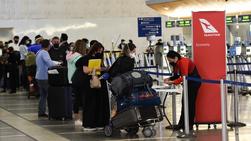 This photo taken on July 17, 2018 shows a Cebu Pacific plane (top) preparing to land past a Philippine Airlines (PAL) plane (right) at Manila International Airport. (TED ALJIBE / AFP)
This photo taken on July 17, 2018 shows a Cebu Pacific plane (top) preparing to land past a Philippine Airlines (PAL) plane (right) at Manila International Airport. (TED ALJIBE / AFP)
SYDNEY/CHICAGO - Global airlines are bracing for more volatility due to the Omicron variant of COVID-19 that could force them to juggle schedules and destinations at short notice and to rely more on domestic markets where possible, analysts say.
Many travellers have already booked trips for the Christmas period, a peak season for airlines, but there are growing industry concerns over a pause in future bookings and further delays to the already slow recovery in business travel.
Fitch Ratings said it had lowered its global passenger traffic forecasts for 2021 and 2022, with the emergence of new variants like Omicron highlighting the likelihood that conditions would remain volatile for airlines.
"It feels a little bit like we are back to where we were a year ago and that's not a great prospect for the industry and beyond," Deidre Fulton, a partner at consultancy MIDAS Aviation, said at an industry webinar on Wednesday.
Fitch Ratings said it had lowered its global passenger traffic forecasts for 2021 and 2022, with the emergence of new variants like Omicron highlighting the likelihood that conditions would remain volatile for airlines
Omicron's impact will vary by country and region due to each government's response and the diverse nature of global airlines as well as their business models.
Japan Airlines and ANA Holdings on Wednesday suspended new reservations for international flights arriving into Japan until the end of December as the country tightens border controls.
Hong Kong's Cathay Pacific Airways, which lacks a domestic market and is operating at only 10 percent of pre-pandemic capacity, said it was too early to assess Omicron's impact on demand.
ALSO READ: Airlines see sharply lower losses in 2022, recovery in sight
Airlines in countries with large, strong domestic markets like the United States and Russia are better shielded from the greater uncertainties of international travel.
An analysis by UBS shows US carriers have not yet changed their scheduled capacity, which is running at 87 percent of 2019 levels in December and is expected to reach 92 percent of pre-COVID capacity in January.
 Travelers wait in line to verify their COVID-19 vaccination status as they check-in for a flight to Sydney, Australia on Qantas Airways Ltd inside the Tom Bradley International Terminal at Los Angeles International Airport on Nov 1, 2021 in Los Angeles, California, as Australia's international border reopens almost 600 days after a pandemic closure began. (PATRICK T. FALLON / AFP)
Travelers wait in line to verify their COVID-19 vaccination status as they check-in for a flight to Sydney, Australia on Qantas Airways Ltd inside the Tom Bradley International Terminal at Los Angeles International Airport on Nov 1, 2021 in Los Angeles, California, as Australia's international border reopens almost 600 days after a pandemic closure began. (PATRICK T. FALLON / AFP)
United Airlines is launching its Newark-Cape Town route on Wednesday despite a US ban on non-citizens entering from South Africa and Delta Air Lines said bookings over the Christmas period were strong.
Major European airlines are far more dependent on international travel than their US counterparts, placing them more at risk of fallout from the Omicron variant
"In the past year, each new variant has brought a decline in bookings, but then an increase once the surge dissipates. We expect the same pattern to emerge," said Helane Becker, an analyst at Cowen and Co.
Travel booking website Kayak said international travel searches from the United States were down only 5 percent on Sunday - a stark contrast to a 26 percent fall in searches from Britain, which had tightened testing requirements for arrivals.
Major European airlines are far more dependent on international travel than their US counterparts, placing them more at risk of fallout from the Omicron variant.
In Asia, countries like Australia, Japan, Singapore and Thailand had only begun to cautiously lift border restrictions in recent weeks and passenger numbers remained at fractions of pre-pandemic levels before the Omicron variant was discovered.
READ MORE: Asia's airlines ramp up flights, offers as virus travel curbs ease
John Grant, chief analyst at travel data firm OAG, said moves by Japan and Australia to delay entry to some foreigners due to Omicron were "sad and frustrating" but the proportionate impact on travel was "relatively insignificant".
Airlines globally have been more agile about quickly adjusting their schedules and destinations during the pandemic and that is expected to continue, he said.


